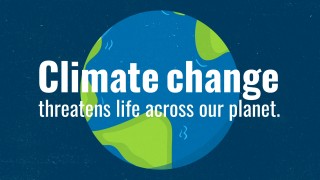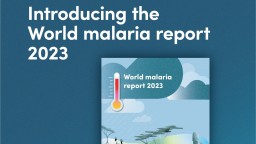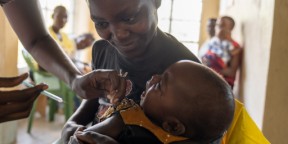Climate change is helping create the perfect storm for malaria
This year’s World Malaria Report reflects on the effect climate change is having on the fight against malaria – and the rising threats we need to tackle if we are to reach zero malaria in a generation.
For the first time, the World Malaria Report has included a chapter on malaria and climate change. Extreme weather and changing rainy seasons are impacting malaria programmes and making the disease harder to predict and control. This affects the world’s most vulnerable communities most and threatens years of progress.
The after-effects of the COVID-19 pandemic continue to be felt, with resource constraints growing tighter, and biological threats like insecticide and antimalarial resistance and new invasive mosquito species.
2023 marks the halfway point of the 2030 Sustainable Development Goals, and the world is dramatically off track to reach most of them. Without urgent and aggressive action, the increasing global malaria burden could leave us significantly off the mark.
Despite these mounting challenges, an estimated 2.1 billion malaria cases and 11.7 million malaria deaths were averted globally between 2000 and 2022.
Amid COVID-19 disruptions, malaria programmes continued to save lives. An estimated 2.82 million malaria deaths and 549 million cases were averted between 2019 and 2022. Community health workers for malaria programmes played a key role in sharing health information and ensuring access to care throughout the pandemic.
Now more than ever, we need renewed momentum around funding, leadership and political will in the fight against this disease. We can still end malaria – but we need decisive action to get back on track.
Gareth Jenkins, Executive Director of Advocacy and Strategy at Malaria No More UK, said: "The findings of the 2023 World Malaria Report serve as a painful reminder that malaria continues cruelly to claim hundreds of thousands of lives each year. A child dies every minute from malaria and this year's report confirms that malaria cases and deaths are still way above pre-pandemic levels.
What is also evident is that the increasing impact of climate change and extreme weather events are severely undermining gains in the fight against the deadly disease, as well as other emerging threats such as drug and insecticide resistance, constrained funding, humanitarian crises and conflict.
It is absolutely vital that the UK continues to work with its global team of allies and ensure that malaria-fighting treatments, tools and vaccines reach those who need them most through investing in global institutions such as Gavi the Vaccine Alliance, and The Global Fund to Fight AIDS, Tuberculosis and Malaria. By fighting and ending malaria, we will save the lives of millions of children."
A new animation shows why we need action now
Together we have the knowledge and tools that can accelerate efforts to end malaria and help communities adapt and provide rapid support during climate emergencies.
But with every day we wait, the impacts of climate change become stronger and rising threats will make it harder to reach zero malaria.
A new animation narrated by the newest Zero Malaria ambassador, young Kenyan climate and health champion Ellyanne Wanjiku Chylstun, shows how the right funding and commitments can save millions of lives – putting us back on the path to ending malaria for good.







